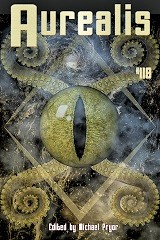“The Excuses We Make for Our Children” by Rebecca Fung
Reviewed by Victoria Silverwolf
Two tales of supernatural horror and a science fiction story with the flavor of fantasy appear in the latest issue of this Australian publication.
“The Excuses We Make for Our Children” by Rebecca Fung begins with a woman mourning for a dead son. She believes that a kappa, an aquatic being from Japanese mythology, killed him. The narrator is her best friend, a childless woman whose husband abandoned her. Before the death of the boy, she secretly took a kappa into her home, thinking of it as her child. Now she must face the possibility that the kappa is a murderer, while protecting him from the grieving mother’s lust for revenge.
The narrator’s dilemma has strong emotional power. When the plot turns into a violent battle between the two women, it is less effective. The story works better as a portrait of intense parental loyalty than as a tale of terror.
The title character of “Ogali” by Nuzo Onoh is a young woman who has died from what is believed to be a supernatural curse. A young man is magically transported from his own home to the place where her body lies. Her dead hand grips his wrist, and he cannot free himself. The local witch doctor tells the terrified man that he must confess the crime he committed against the woman. He claims to be innocent of any wrongdoing. Eventually the truth comes out, and both justice and tragedy follow.
The reason behind this horrific event involves an issue of global importance, particularly for the nations of Africa. There is much local color, which makes the story come to life. Otherwise, this is a typical tale of revenge from beyond the grave.
“Dog Nebula” by Subodhana Wijeyeratne features a man traveling alone through interstellar space. He lands on a frozen world. To his amazement, a woman sends him a message from the surface of the icy world, inviting him to tea. She lives in a luxurious dome, full of art treasures and fine furniture. After spending some time with her, the man learns her true nature.
Many of the events in this story are implausible, if read as science fiction. Considered as fantasy, it serves as an allegory for loneliness. If the reader is willing to accept the improbable plotline, the appealing characters add to the enjoyment.
Victoria Silverwolf remembered to set the clocks forward last weekend.
 Aurealis #118, March 2019
Aurealis #118, March 2019